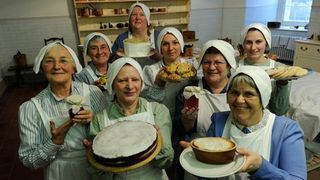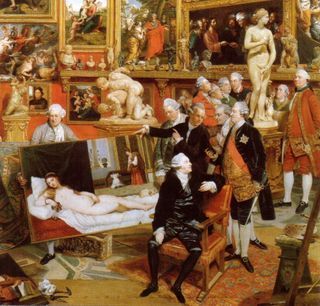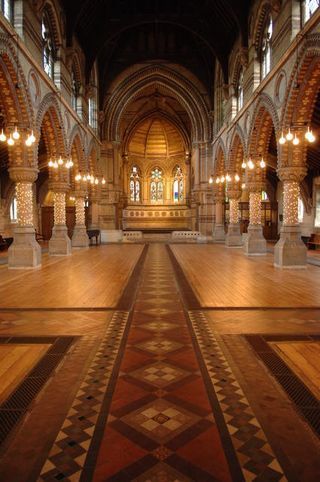Mary Beard's Blog, page 57
March 23, 2012
The view from Euronews. . .what's lost in translation?
I am now back from my 5-days of total French, and I am feeling pretty pleased with how it went. Haven't felt so knackered for years, but I ended up with a very strong conviction that I could speak and understand French much much better. The fact is that reading French for me has never been a problem (and for some bits of my work I read as much in French as in English); it's the expression orale and the compréhension orale that's been the weak spot.
But how do you know that you've made the leap, beyond just feeling that you have? Well for me one of the best bits of the whole experience was when I came back via Bruxelles and spoke, in passing, to a few guys in French (ticket collector etc) and they actually replied in French...rather the usual English I've been met with in the past. Surely a sign of progress.
The problem is now how to keep it up. No point in getting fluent in French in March, and losing it all again before you lecture in June.
So I'm planning a weekend in some non-Anglophone area of la France profonde, I'm listening to the cds I came back with, and I'm following Anthony Alcock's advice in response to the last post. I'm listening to the French version of Euronews (with its videos AND written versions, so you can check if you've got it right) . . . repeating what they say back to myself. Sadly, "le tueur de Toulouse" is horribly good for my "u"s and "ou"s.
The up-side (or the down side, depending on you point of view) is that I am going to get really nerdishly up in the details of French news and the French elections. I had been doing this prep last night, when the husband came into the kitchen to announce that President Sarkozy had decide to bang up anyone who looked at a terrorist website. And this indeed what a lot of newspapers and the BBC were saying (conjuring up a horrible vision of some poor innocent granny stumbling by accident on a "hate site" and being instantly whisked off by "les flics" (or "les poulets" as I was taught in Belgium... a decidedly different form of animalization of the forces of the law from "pigs").
Anyway, though being no fan of Sarkozy (except for his nice clear accent when being grave), I was instantly able to say that that was definitely not what the guy had said. I'd just watched him and he talked about the criminalization of those who consult such sites "de manière habituelle" (even the simultaneous translation of Sarkozy's speech on the BBC website omitted that key phrase!).
Now, that still might not be the right way to go, but Sarkozy really wasn't talking innocent about grannies.
Made me wonder how often the news from France loses something in translation.
March 18, 2012
French immersion
I am writing from Belgium (the wonderful town of Spa, to be precise), where I have come for a five day French immersion course.
My problem is that I have to give a big lecture in Paris in June. 10 years or so ago I used to get by lecturing and (even more crucially) answering questions in French, but I haven't done it for years, and "rusty" would be too polite a term. My first instincts were to start taking regular conversation lessons in Cambridge, but realism soon intervened. I would be bound to end up cancelling them when something apparently more interesting came my way and frankly I couldnt see myself sitting round the kitchen table (or at the desk at the Alliance Francaise) jabbering away in French "en plein Cambridge" ("en Cambridge profonde"?).
So I decided to opt for the (re-)baptism of fire and go for a total immersion course. The pricey option. My Faculty and college (thank you) both contributed a bit to the cost, but I'm still spending more than I will get in the fee. But look on the bright side. I will know French a lot better by the end of this.
I chose a place from the web...in fact I picked about the only language school which I could find which actually talked about helping academics with lectures to give (rather than just a business deal to make). And I committed myself to a regime of 6 hours one to one lessons a day, plus social interaction (with language correction) entirely in French.
As the date got nearer, I got progressively more scared. My fantasies ranged from the idea that the whole thing might have been a scam (set up to trap Anglophone lecturers in France) to the thought of a "hell is other people" scenario, locked up with assorted and unknown students and teachers for 5 days... with no escape.
In fact I have fallen on my feet.
It's turned out to be everything that I could want. I have practised all those French vowels that noone has ever made me practise before (I have spent several hours on "u" and "ou"... "Le Sud Soudan" has been a particularly tricky phrase to practise at speed). This afternoon (with the admirable Stephanie) I went through part of a French tv documentary on Rome, actually writing down every word spoken rather than simply picking up the drift. I can't tell you how useful it was. And this morning I discussed Roman laughter (the subject of the lecture) in French with Raphael, who is both a language teacher AND a classicist .. and he had all kinds of suggestions about how to rethink some of what I wanted to say in a French cultural context (among other things, we looked at a YouTube clip of Coluche). How many language teachers do you find who can talk about Dio Cassius?
So I am dead knackered, but dead happy. And no snobby remarks about learning French in Belgium, as I will argue back with passion.
Actually this turns out to be an amazing area. Jean-Luc and Claudine (the bosses of the place) gave me and my fellow student (an American diplomat) a trip around 8 of the health-giving springs of the area after classes this afternoon.....and I have never tasted such a collection of sparkling, ferrous, sulphorous waters.
March 14, 2012
Who else hates telephone fund-raising?
Some years ago, my college decided to go in for an annual campaign of telephone fundraising -- that means getting current students to ring up ex-students and ask them to get cheque books and credit cards out and give to the old college. Some of us awkward squad objected strongly to this. It all smacked far too much of double glazing salesmanship, and the worst excesses of cold-calling. And wasn't there a risk that it would actually put people off giving money? (It certainly would me . . .)
We were assured that it was not "cold", as people would get a letter in advance to explain that they were about to be called and would be able to write and ask not to be (... get real I thought). And we were told that even if it did put off the occasional mavericks (like us), it would raise a lot of money on its own account -- and re-establish relations with alumnae.
We were democratically overruled, and in a way we have been proved wrong. The annual campaigns have raised a lot of money and most of the ex-students called claim to have enjoyed speaking to current students (and vice versa)
Fair enough. But I still don't like it. When I myself was mistakenly called by a student telephoner a few yeasr ago, I'm afraid -- a bit to my shame -- I made mincemeat of her. And when the husband was called by someone from his old college a few days ago, I think he gave them a bit of the treatment he usually reserves for double glazing salesmen.
But in this case there was a sequel, which suggests that the whole thing has got even more corporate and slicker.
Because this morning a postcard arrived from the lad at the college, with whom the husband had had his "unsatisfactory conversation". It was a picture on one side of a group of students (the caller had put a ring around himself), and the message was sweetly polite "I am really sorry that we did not have the chance to speak further the other day....I would have loved to talk about your academic life in Cambridge. One of the areas that we are fundraising for is the tutorial system, which I am sure you feel passionately about etc etc ."
Uncharacteristically, the husband's stony heart was beginning to be melted by this... which he was taking to be a spontaneous card from the lad with whom he had been a bit unfortunately brusque.
To the cynical don, however, it didn't seem remotely spontaneous. After all, the card had been put through the college franking system (and even Oxbridge colleges aren't so generous that they give the students free postage for their private correspondence). And the smiling group of undergrads in the picture didnt seem like the usual student postcard of choice.
Presumably this was another notch up in slickness in this whole operation. In the phone campaign room, there is obviously a pile of these cards, and when the students get an awkward customer, they are told to write to them before they finish their shift... probably using that line about the tutorial system. (As it happens we both do feel passionate about the tutorial system, but we'll be damned if we'll be told we do by a young telephone campaigner).
It all reeked a bit of those handwritten letters you get from spoof "teachers in training" somewhere in sub-saharan Africa, who have no money to complete their course and have just sold their only remaining goat. A real heart wrencher, until you realise that it's been dictated and copied by the hundred (and that anyway their teacher traning college doesn't actually exist).
Has anyone else had one of these telephone campaign cards? Or am I being to cynical about its genesis? Was it a genuine gesture of friendship from the lad in question, as the husband had liked to think?
March 11, 2012
A visit to National Trust fake kitchens
We loaded up a few students and motored off to Ickworth this afternoon -- a National Trust property in Suffolk, where we intended to do some country-house creeping and to have a look at the late nineteenth-century "Pompeian room" (actually the paintings are based on a house excavated in Rome in  the late eighteenth century).
the late eighteenth century).
There was a bad start when we walked in through the front door and the nice volunteer told us that the Pompeian Room was closed for shortage of staff. Full credit where it is due: we looked crest-fallen and explained that that was what we had come specially to see, and she rang up the manager on duty -- who quickly turned up to take us in. Top marks National Trust for that; thank you.
But we didnt feel quite so buoyant, though, when we discovered what must have been the reason for the shortage of staff -- namely that a large number of them had been redeployed to the newly opened below-stairs kitchens.
 So after we'd looked at the large number of Zoffany's in the house (including this one), a fantastic self-portrait of Madame Vigée le Brun (on the left), a brilliantly vulgar clock decorated with the scene of the sacrifice of Iphigenia, plus one of Benjamin West's many versions of the Death of Wolfe, we decided to venture to the basement.
So after we'd looked at the large number of Zoffany's in the house (including this one), a fantastic self-portrait of Madame Vigée le Brun (on the left), a brilliantly vulgar clock decorated with the scene of the sacrifice of Iphigenia, plus one of Benjamin West's many versions of the Death of Wolfe, we decided to venture to the basement.
It wasn't exactly our cup of tea.
It was a whole suite of rooms, kitchens, estate managers office, servants' loo, visiting valet's room -- all kitted out to be look-alike early twentieth century. Some of it was suspiciously new (a lot of brand new wooden draining boards) and some of it was a bit stage-setty (the great big boiler had a fake fire in it, 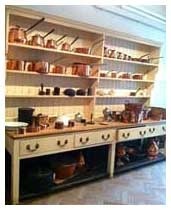 and a fake noise machine). Most people were obviously enjoying themselves. You were allowed to touch almost everything and there were plenty of "ooh look I remember brillo pads like that" kind of shrieks.
and a fake noise machine). Most people were obviously enjoying themselves. You were allowed to touch almost everything and there were plenty of "ooh look I remember brillo pads like that" kind of shrieks.
What we didn't much like was the "re-con", the folksy stories that some of the volunteers were keen to inflict on us (about drunken sacked butlers etc) and the glaring fact that most of the paraphernalia (pots and pans and brillo pads) were fairly obviously imported props. But we were nevertheless a bit silenced in the face of the obvious enjoyment of most of the visitors, not to mention the wholly admirable desire to display the servants quarters.
It was only when we sat down to tea (excellent cakes, by the way) and discovered the extent of the fakery that our blood began to boil. According to the (admirably honest) guidebook, the main kitchens weren't even in that part of the basement (they were in the wing of the house that is now used as a hotel); the most there had been in the newly re-opened bit was a place where the food waited to go upstairs. The "servants hall" is a remade copy of the real hall in the now inaccessible East Wing (and the servants bells have been moved across from there to give the right impression. The estate manager's office and the servant's bedroom are both more or less modern fantasies. . .and indeed most of the equipment etc, we were told when we asked, had been donations, with nothing to do with Ickworth at all.
So, dear National Trust, while you shut your brilliant nineteenth century Pompeian Room, and make very little effort to explain to your visitors what they might get out of such world changing pictures as the Death of Wolfe, you invest over £2million of lottery money in faking up a service area.
I'm as keen as the next socialist on exploring the lives of the ordinary people who kept these houses running for the toffs upstairs, but it's insulting to them and us to create a Disneyland servants quarters -- and fob us off with it.
No wonder they let you touch the stuff ... it's not much more than a stage set.
March 8, 2012
How many condoms did Zoffany paint?
I went, earlier in the week, to get a glimpse of the new Zoffany exhibition at Royal Academy: Johan Zofanny RA: Society Observed. I 've always liked his stuff without knowing very much about him. But the big draw on this occasion was the chance to get a close look at his painting of the "Tribuna of the Uffizi" (1772-1777) -- detail above -- picturing the famous gallery in Florence, packed full of antique aculpture and modern painting. I'd written about this years ago (in particular about the group of men leering at the flesh of the Venus de Medici), but I'd never actually seen the original.
As always there were some surprises in store. It wasn't as big as I had imagined it, but much more detailed, full of jokes, stories and cheeky collocations. And Titian's "Venus of Urbino" was a lot more prominent in the original than it ever seemed in the reproductions -- and much more obviously in dialogue with the Venus de Medici statue. The same was true of the Uffizi Wrestlers just behind, and the characters admiring it. The guy with his hand on the edge of the Titian, and pointing back to the Wrestlers, was apparently an instantly recognisable Thomas Patch, who had been banished from Rome for homosexuality. Originally -- according to the catalogue -- Zoffany had painted a black 'patch' onto the bum of one of the Wrestler's, just to make the point.
Anyway we then explored some of the paintings we didn't know. One (from the Gallery at Parma) was a curious self-portrait of Zoffany apparently putting on a friar's outfit, actually getting ready to go out to party in fancy dress. And he's looking forward to a good time, for on the wall were hanging up, the label said, two condoms.
"But" asked the husband, "why do they say "two"? There's three of them hanging up -- a pair, and one a bit further to the right."
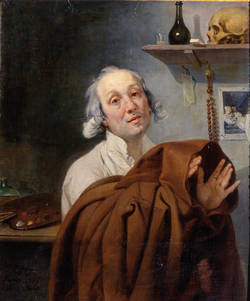
And that's certainly what it looked like. In fact it looked as if the condom on the right was neatly hanging over yet another version of the Venus of Urbino...just to rub in what the painting was all about. We didn't linger long, but decided to check it out when we got home.
That's where the story took a curious turn. Every single image I could get of this painting, including the one in the catalogue (above), crops off a good few centimetres on the right hand side, so you can't actually see what's going on there, and whether there's a third condom or not. In fact, in a major article on Zoffany self portraits (in the Art Bulletin 1987), William Pressly explains that even he hasn't seen the original painting and has only had access to a photo slightly cropped on the right. On the basis of that, he concludes that Zoffany had painted a strange tear in his image of the Venus of Urbino -- a significantly condom-shape tear (and that's the line repeated in the new catalogue).
So did we just misread the 'tear'? Or did we see exactly what we thought we did, ie condom number three? And, if so, then the necessary gloomy conclusion is that none of those writing about this picture, even the exhibition caption writer, has actually looked at more than a cropped photo of it. (OK a bit like me and the "Tribuna", fair cop . . .but, all the same . . . )
If anyone knows the painting (even more curious than I have indicated, as it's on the back of a "Flight into Egypt" -- just how weird?) can you enlighten on the condom question? Or if you go to the show, will you check it out?
March 6, 2012
The coffee police
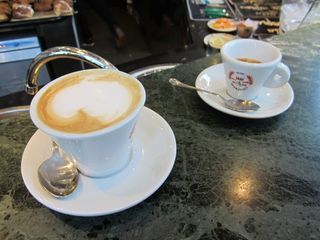
I am just on the way back from Rome, where we have been doing the final weekend's filming for the new Romans series (which I THINK will be broadcast in April on BBC2). We are a happy crew ably managed by the producer, Caterina, who is brilliant at everything . . . except we do have one area of domestic controversy, and that's in the coffee department.
Caterina (on the right) is Italian and you will probably already have guessed what this might be. It relates to the time  of the day when it is appropriate to drink cappuccino. The truth is she goes a bit pale, and looks as disapproving as she can muster, when any of us order a cappuccino after about 11.30. From then on, it should be espresso only -- or if milk has to be there, then it should be a macchiato.
of the day when it is appropriate to drink cappuccino. The truth is she goes a bit pale, and looks as disapproving as she can muster, when any of us order a cappuccino after about 11.30. From then on, it should be espresso only -- or if milk has to be there, then it should be a macchiato.
It is, of course, one of the old "English in Italy" problems, and it isnt really soluble.
On the one side are the "Inglesi Italianizzati", who though busting for a nice frothy cappuccino, really wont be seen dead with anything but an espresso. When I was a graduate student in Rome, I knew plenty of those, "gone native". And I always suspected that they went back to their rooms and brewed themselves up a nice frothy,milky cappuccino in the afternoon when no-one was looking.

The other option is to say sod it (like Prof Woolf above)... I want a cappuccino, so I'll bloody have it. But that means braving the pained expression of Caterina -- and, as happened this lunchtime, the slight sneers of the waiters at the snack bar.
I have to say that as I've got older, I veer more to option 2 than option 1. But I have also tried to work out why the post-11.30 cappuccino feels so dreadful to a bona fide Italian. And I think I have finally got the analogy.
Imagine you were taking an Italian friend out to lunch. It came to the pudding, and they said to the waiter "What I'd really like is a bowl of cornflakes" .
You'd look as amazed (shocked/frosty) as Caterina does with us on the cappuccino beat.
And all this makes me wonder what Indian waiters at Indian restaurants have to put up with. When we order a combination of what is to them Christmas pudding, mixed with chippolatas, apple sauce and creme brulee... they've just learned to shut up and put up, I guess.
(Though does anyone remember the old Gan Path near Kings Cross (it gets a name check here).. the cheapest restaurant in the Good Food Guide for a while. Closed more than a decade ago. But there the waiters could be pretty stern on their customers and did adopt a Caterina-like expression from time to time, and made it quite clear your were making a culinary faux pas).
March 1, 2012
When was the Colosseum built?
Some myths (aka factoids) about the Roman world are so ingrained that I have begun to despair of ever unseating them. Pride of place -- beyond even the dormouse consumption, or the vomiting between dinner courses -- must go to the idea that the Colosseum was always there, pretty much as long as Rome was Rome.
In fact, that's what even some of our brightest and best seem to assume. In a nice article skewering the 2012 Olympics hype a few weeks ago, Simon Jenkins referred to the recent cabinet visit to the Olympic site. "The Olympics are now being so oversold" he wrote, "as to risk self-parody. Not since Nero hauled his court to the Colosseum has anything been sillier than David Cameron holding a Cabinet meeting yesterday at Stratford to discuss rebellion in a distant province of his empire, Scotland."
And then, just this morning, on "Thought for the Day" the excellent Michael Banner of Trinity Coll, Cambridge, talked of the Romans during the lifetime of Jesus watching the gladiatorial games in the Colosseum.
Both were as eloquent as usual. The trouble is that the Colosseum was not built in the reign of Nero (54-68), still less in the lifetime of Jesus (his earthly lifetime that is). It wasn't even an apple in any designer's eye. And there is no possibility whatsoever that Nero could have hauled his court off there, Cameron-style.
No, the Colosseum was not started until the reign of Vespasian (69-79 AD), and it wasnt actually inaugurated until 80 AD, under his son Titus. It was built by this brand new Flavian dynasty, using the profits that they had accrued from brutally quashing the Jewish revolt, and carrying off to Rome the Jewish treasures (and captives).
It might look like a bit of Neronian megalomania, but actually it was built by the Flavians as a way of countering the excesses of Nero. That is to say they built it on the site of the great lake that was one of the centrepoints of Nero's vast palace and pleasure gardens known as the "Golden House". This palace had been one of the PR disasters of the reign; people complained that it took up the whole city, pushing out the rest of the population to house just one man in style. "Romans flee to Veii," one piece of graffiti ran, '"the whole city's becoming just one house."
In truth, the Flavians went on living in part of Nero's palace, but they made a vast bid for public approval by draining his lake and erecting a vast arena on the spot: the message was that the Flavians were making over to public use what Nero had monopolised for his own private (aquatic) pleasures.
So no Nero in the Colosseum, and none of those citizens of the time of Jesus. Thet were watching their gladiators in much smaller, often temporary locations.
. . . oh, another thing about the Colosseum. I think I'm right to say that we can't identify for certain, from any reasonably reliable contemporary evidence, a single Christian martyr put to death there. Sure, some were, but a lot more were invented later.. and we cant actually be sure who was who, and which was which. We can actually list more confidently those martyred in Carthage or Lyons.
So remember all this next time you watch a movie featuring Nero presiding over a lions v Christians show in the Colosseum.
February 27, 2012
Giving up booze for Lent
As I hinted in my last post, I have gone dry for Lent. I am not doing this for religious reasons -- so why? Two reasons...
First of all, I want to make sure I can do it. According to the government guidelines, I drink too much. I'm pretty sceptical about the guidelines. Where did they come from? And who actually decided how much was too much, and on what basis? And who invented this word "unit", which seemed to spring from nowhere sometime in my 40s? All the same, I'm pretty clear that if I couldnt do without the demon drink for a self-imposed month a year, then I'd have problems. So it's a checkout against alcoholism, I guess.
Second, I am sure it must be good for me, and for my hardworking liver. The stuff is poison after all, so a break from it is bound to be restorative. Detox basically.
Why in Lent, if not for religion? Well because there is a supportive culture of abstinence around in Lent that makes it a bit easier. That means you can go to a party and say you're not drinking because it's Lent, and no-one will say "Oh go on, just one". They might think, "I didn't know SHE was religious", but they won't force a glass of Pinot Grigio into your hand.
So is it easy? And do I feel better?
In fact -- a few really tough days apart -- it isn't quite as hard as you might imagine. And it teaches you how much drinking is sheer habit. Between about 6.30 and 7.30, yes it's a struggle. That first glass of wine of the evening is hard to resist (and ginger beer doesn't hit the same spot). But once that hour has gone, and even more when supper's over, the desire has more or less dried up. (I know it's habit because I find the same thing at lunchtime of Sunday, but on no other day of the week.. and that cant be physiology.) So that's good news really.
The problem is that I don't actually feel any different, or better. In fact, overall I feel rather less healthy. The point is that first much missed glass of wine is a 'change of gear' glass. It's not that I dont work more or less every evening (the don doesnt have much of a LIFE at the moment), but after a drink and some food, it's at a different tempo and with a slightly different agenda (reading manuscripts, making power points, writing minutes, and so on). Without that change of gear, I find I just go on and on and on in exactly the same gear .... until it comes to 2 o'clock or so and I decide I have to go to bed (the other good thing about drink is that it means I tend to feel quite tired by 12.30...). Abstinence, in other words, leads to obsessional single mindedness and over-drive, which I think long term might be as bad for me as the booze.
Anyway, we're one week in; just over 5 more to go. The truth is that unlike good Christians, I tend to hit the bottle again on Maundy Thursday. It makes for a riotous Easter.
February 23, 2012
Funerals and remembering
Today I went to the funeral of my friend John House, an art historian who worked on Monet (inter alios). I had met him sometime in the early 1980s, at a party given by a couple of friends in London (him and her) -- one of those parties you still vividly remember a few decades later, even if you cant remember exactly what year it was. If you'd have told us then that, all these years down the line, we'd end up shedding a tear at each other funerals, we wouldn't have believed you.
John was only 66 (and yes, if you'd have told us then that one day we would be saying "only 66" we wouldn't have believed you either). He apparently had a heart attack while taking the cat to the vet -- which for him, I guess, must have been as good a way to go as you could hope for. For anyone close to him, it was a complete knockout, a bolt from the blue. (Everyone was talking about when they last saw him -- for me it was at the opening of the Hockney exhibition, and indeed he was one of the people I met who had the most caustic things to say about 'late Hockney').
Anyway, especially in the circumstances, it was a brilliantly choreographed and very moving farewell... a cremation first, followed directly by a thanksgiving in a stunningly restored Victorian church, St Stephen's, near Belsize Park tube station. A church, but there was no God (instead of the Lord's prayer, there was a passage of the younger Seneca). And the wine didn't only follow, it also accompanied the proceedings -- so thay everyone could toast John from their chairs as we finished the formal proceedings (this was actually a bit of a bummer for me and the husband as we have given up the demon drink for our non-religious Lent... and we dont get an indulgence on day 2, even for a funeral).

John hadn't exactly been a meat and two veg, feet up in front of the tv, kind of guy. But the frankly tumultuous private life was all part of the occasion. There were warm tributes both from his ex-wife and from his current partner...both of them said that he could occasionally be absolutely infuriating; and I bet there were a few broken hearts having a quiet weep when Buddy Holly ("Every Day . . . Love like yours will surely come my way") filled the church.
But there were two especially memorable moments for me. The first came from John's niece, who read straight-faced a quasi-scientific account of John's favourite animal, the hippopotamus... it wasn't long before most of the audience had twigged that this was actually a pretty good description of John himself... larger than life, noisy, exuberant, and very keen on lady hippos. Then finally his nephew captured the totally compelling enthusiam, the "interestedness", the kindness and the occasional sheer silliness of the guy -- from trekking round Victorian churches, photographing everything in sight, to cherishing a new pair of cheap hippopotamus socks. Not to mention calling a spade a spade... he was, the nephew fondly recalled, the first person he'd ever met who actually called "shit" "shit". 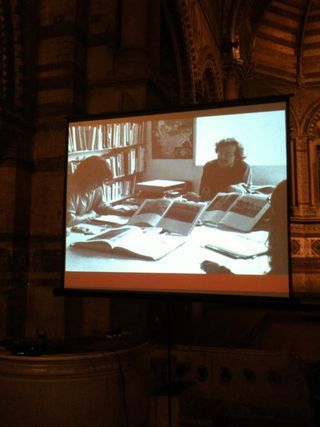
After all this a gallery of photos appeared on the screen (tiny glimpse of the young lecturer House on the right), to the accompaniment of more drink, at least for the non-abstinent. And then most of us, I suspect, went away still not really having taken in the fact that he was actually dead.
Oh yes, let's be honest, wondering who would be next.
February 20, 2012
Les Ebdon and Million+
I suspect that no one quite knows what Les Ebdon (above in academic rig) will do as the head of OFFA. In the run up to his appointment I have been torn between distaste, on the one hand, for the vested interests of fee-paying schools and their parents (gosh, what are we paying for if some bloke is going to come along and take away the privilege) and, on the other, for the apparent lack of concern by Ebdon and co for subjects that I suspect they don't really understand (if you wnat Classics or Music to survive as high level, international subjects in this country, you'll have to do something to schools as well as to Uni admissions offices). Honestly, there's something vulgar about both sides.
I did, however, decide to take a look at the website of Million+, the think tank backed by a group of new univesities of which Ebdon is the chair. First let me say that it must be right that universities come in many shapes and sizes. I dont want every university to teach Latin, any more than I want every university to teach Sports Science (worthy as both those subjects are or may be).
That said, alarm bells rang looking at the stuff Million+ has just put out.
There's a new report from them, called "Teaching that Matters". It's about the teaching revolution" that is "underway in modern universities", and the new approach to the student learning experience. No more boring PowerPoint presentations, it said.. but interactive learning. Well let's leave aside the fact that many of us have never done much PowerPoint anyway and have always been pretty interactive, face to face... it's what this report doesn't say that is a bit alarming.
I searched the full report for the word "read". I t came up just once, as a past particple, in a soundbite from a satisfied student from the University of Bedforshire (Ebdon's uni). "The Business Pods were actually the reason for my choosing to come to University of Bedforshire. I read a lot about other universities but not had such a creative looking environment". I had another go with "book"; that came up only in the word "bookmark". Then "library" produced just a reference to how the new Business Pods have replaced "library inductions".
Now many flowers should bloom in higher education, but it is hard not to worry that Ebdon in his role as Access Czar comes from a background that doesn't actually notice books, libraries or reading ... and babies might be about to get thrown out with the bathwater. In the end, we want access AND high academic standards (and high academic standards do include reading). Most of us working in higher education dont think that access is incompatible with high standards; I have a feeling that Ebdon is a bit more one sided.
PS. A quick look suggests that the parallel document (Research that Matters) is very much of the same style . A search for 'humanities" brought rather thin pickings. Maybe that is not a complete damnation (maybe it's legitiame for 'new' universities to concentrate research elsewhere). But cutting edge research in my kind of subject isnt much helped by Business Pods.
Mary Beard's Blog
- Mary Beard's profile
- 4112 followers





